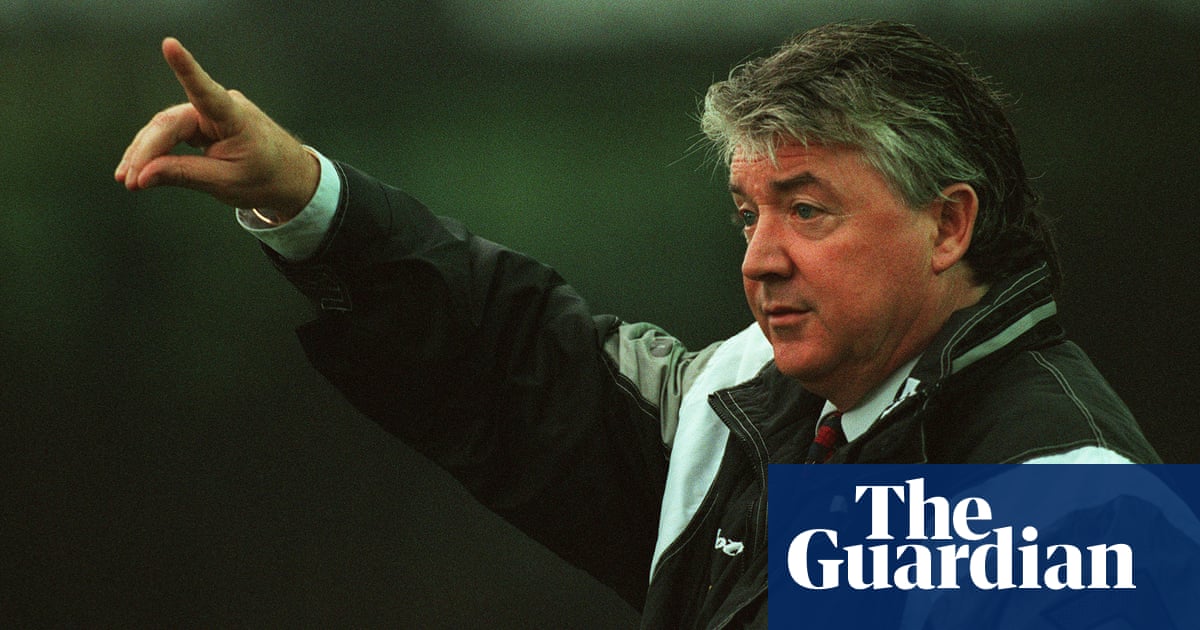
In Northern Ireland, it is hard to escape the impact David Healy had on the national team. A large mural in Belfast captures his most famous night, when he scored the winning goal in a World Cup qualifier against England in 2005. Healy created magic from scraps while playing for Northern Ireland. Now, as Linfield manager, he is enjoying more special nights at Windsor Park.
Last week Linfield beat Norwegian champions Bodø/Glimt 1-0 in a Champions League qualifier. Having thrashed Roma 6-1 in the Europa Conference League last season, Bodø were expected to dispatch Linfield with ease. But the Irish League champions travel to Norway for the second leg of the tie on Wednesday with a slender lead.
“One thing I never do is get caught up or get carried away with results,” says Healy. “We’re halfway there and all we’ve done is given ourselves an opportunity. Bodø are an exceptional team and we rode our luck at times. As good as we were defensively, and decent on the break, we’ll need to be better in Norway. It’s going to be a tough ask, but the players all have belief. We go in with a small advantage. We wanted to go to Norway with a chance and that’s exactly what we’ve done.”
Linfield striker Kirk Millar’s calm chip in the 83rd minute in Belfast could have been a tribute to his manager’s playing days. Healy’s ability to score goals against the run of play for Northern Ireland at Windsor Park was unparalleled. He scored 13 in 12 matches during the Euro 2008 qualifying campaign, setting a record that was equalled by Robert Lewandowski in 2015. His highlight reel included a hat-trick against Spain that was completed with an audacious lob over Iker Casillas.
Having been such an iconic player in Northern Ireland, his transition to management in 2015 brought its own challenges. “On my first day at Linfield I remember having a real fear and trepidation,” he says. “I was incredibly nervous. You get one chance to make a first impression. I was no longer David Healy the player. I needed to introduce myself as David Healy, the manager and a first-team coach. I was totally out of my comfort zone and didn’t know what to say. The club weren’t employing me based on my playing career; they wanted a manager. I knew this was a different job and that I had to change, be tough and set standards.”
Healy came through the youth set-up at Manchester United before playing for Preston North End, Leeds, Fulham, Sunderland and Rangers. He only made three appearances for Manchester United but Alex Ferguson left a lasting influence on his work. Healy remembers a man who knew every single person at Old Trafford, from the catering staff to the volunteers.
“I’ve tried to bring a lot of what I learnt from him to my job here. It’s not just about the first-team players, but also taking the time to get to know all the staff in the office, the under-20s and all of the coaches. I try to watch as many games with the kids as possible and I want to know everyone. I want the parents to see me at their kids’ games. Sir Alex did that all the time. Parents knew he was taking a keen interest in their children and that they would be looked after at Manchester United.
“I can’t say I am doing it exactly like Sir Alex, or as well as him, but I try. He knew every single person in the club. Manchester United was a family club that was supported worldwide. The standards were driven by him and the care he took with staff. He made them feel important to the success of the club. Even though it might not have seemed like their role was important on the outside, he made them know that it absolutely was.”
The Linfield players are in their second season as full-time footballers. When Healy took the job in 2015, they trained part-time while also working. The players had the technical ability but were exhausted by the time they trained in the evening. Going full-time has allowed Healy to change that.
“The basic thing we had to improve was their fitness. Before, when we trained three times a week, guys were coming from work – often from really hard, physical jobs. A few were working for the electric company, up and down lampposts; a couple were teachers; and others were working in department stores. They were on their feet for eight hours a day and we were getting them for two hours at night. Then they had to drive home afterwards. We were getting them at a hard part of the day. Now they come in fresh and have breakfast, and we’ve been able to improve their body clocks and prepare far better.”
By his own admission, Healy never replicated his outstanding international form at club level. He was self-critical as a player, always analysing his performances, trying to find an advantage. He was quiet in the dressing room, keenly observing the manager and leaders in the group. He looked up to Roy Keane at United and would go on to play under him at Sunderland and Ipswich. Healy relished Keane’s appetite for high standards and hopes he finds his way back to the dugout one day.
“Roy was hugely popular at United. He was the best player there in terms of the drive he had. When he played well, they tended to win. They had superstars – [David] Beckham, [Jaap] Stam, [Paul] Scholes, you name it – but he was always the one leading and driving the standards relentlessly. I love Roy and we always had great banter, whether it was something about Northern Ireland versus the Republic, or Rangers against Celtic as he was a Celtic man and I grew up supporting Rangers.
“I idolised him as a younger player and still do when I watch him on TV analysing the game. As a young player you had to get your tickets from him as the captain. Some of the lads were fearful, but I had a respect and understanding, and I could speak to him. I couldn’t say anything bad about him. As a manager, maybe I wasn’t the player he thought he’d signed, but I never dropped respect for him. I’m disappointed he hasn’t got another opportunity as he has so much to offer. Football will be a better place with him back as a manager.”
Healy is a diligent student of great sporting cultures and wants to learn what creates the best environment for his players to flourish. He is friends with former world champion boxer Carl Frampton and spent time in his dressing room before a world title defence. He has read in-depth about the basketball coach John Wooden and his pyramid of success strategy. He has spent time with the Ulster rugby team and studied the leadership principles of the All Blacks.
“The All Blacks talk about leaving the jersey in a better place and that’s exactly what I want to do here. Home or away, we will always clear up. We want to leave the away dressing room absolutely spotless. The All Blacks saw their captain Richie McCaw sweeping the dressing room, so they followed. No job is beneath you. Whenever I leave Linfield, whenever that is, I want someone to think this place is incredible, and someone will come in after me and see what improvements they can make.”
Having won four consecutive league titles with Linfield, Healy has been linked with a move to England, Scotland, or perhaps even the Northern Ireland job. Right now, his family are settled in the seaside town of Bangor and he is enjoying building a lasting legacy at the club. He knows that eventually a job offer may come in and test his mettle, but that time has not come yet.
“I was never one as a player to shout for moves, although I look back and maybe I could have stayed at some clubs a little longer. I don’t sit at home and wish I was managing elsewhere. I feel honoured and privileged to still be at Linfield. I’m really passionate about Northern Ireland and its sport. I want to eventually manage in England, Scotland and Europe, but when the time is right and it’s too good to pass up.”
Healy knows his team face an uphill battle in Norway this week but, if they pull it off, he will feel a satisfaction that surpasses the happiness he enjoyed as a player. “The joy I feel with the wins with Linfield in Europe, a league title, or the Irish Cup gives me greater satisfaction. Players are generally hugely selfish. I was a selfish centre-forward. I enjoyed the results and performances I had for Northern Ireland, but as a manager, it’s not an individual thing, it’s not just a centre-forward getting lauded and the plaudits. It’s a far greater team effort, with everyone involved. These wins give me huge satisfaction and it’s greater than anything I ever had as a player.”
Jonathan Drennan is on Twitter and you can read his articles here.












